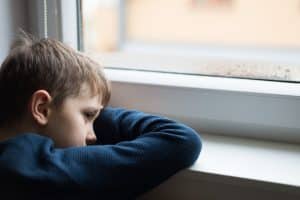What To Do If You Suspect a Child is Being Sexually Abused or Assaulted

According to the National Health Service in the United Kingdom, sexual abuse includes:
- Forcing a child to masturbate or strip
- “Engaging in any kind of sexual activity in front of a child, including watching pornography”
- “Taking, downloading, viewing or distributing sexual images of children”
- “Encouraging a child to perform sexual acts in front of a webcam”
- Failing to protect a child from witnessing sexual activity or images
- Inappropriate sexual touching of a child (clothing or unclothed)
- Penetrative sex
While girls are more likely to be abused, both boys and girls can be sexual abuse victims.
Sexual assault is the nonconsensual sexual touching/contact of another person. Many children who are abused know who their abuser is. Disabled children are more likely to suffer sexual abuse because they can’t put up any resistance. Many acts of sexual abuse or assault begin on the internet.
What are the signs of sexual abuse or assault?
Parents, relatives, teachers, coaches, religious leaders, babysitters, and others can make a difference in the life of a child who is being sexually abused or assaulted.
Many of the signs of sexual abuse/assault aren’t obvious. Some of the signs you have to look for, according to the Rape, Abuse & Incest National Network (RAINN) include:
- Physical signs. Blood on sheets or undergarments, broken bones, and bruising or swelling near genital areas.
- Behavioral signs. Feeling threatened by physical contact, differences in hygiene such as excessive bathing or not bathing, difficulty sleeping, and regressive behaviors such as thumb-sucking.
- Verbal signs. Unexplained silence, being less talkative, and using language that is “too adult” for their age.
Another possible sign of sexual abuse or assault is that the child doesn’t seem to enjoy school as much or doesn’t do as well at school. For example, their grades may worsen.
How to speak to the child
Parents and other adults who are concerned a child is being abused can help the child by talking to him/her. A few guidelines include:
- Choose a place where the child feels comfortable. Don’t speak to the child in front of anyone who might be causing the child harm.
- Be alert to the tone of your voice. Try to make the conversation more casual than serious. Speaking seriously may intimidate the child. Children who feel at ease are likely to provide more accurate information.
- Speak to the child directly. Use open-ended words and questions such as “Has someone been touching you” rather than asking about specific acts of “Understand that sexual abuse can feel good to the child, so asking if someone is ‘hurting’ them may not bring out the information that you are looking for.”
- Be a good listener. Allow the child to speak freely. Follow up on any responses that cause you concern.
- Don’t judge or blame. Say, “I’m concerned” instead of saying, “You said something that made me worry…”
- Be reassuring. Be sure that the child knows they are not in trouble. You’re just asking questions to make sure they’re okay.
- Be patien The child may be scared to talk because of threats the perpetrator made, such as if the child talked, the child may be placed in a foster home or the child or someone the child loves may be physically harmed.
How to report sexual abuse or assault of a child
According to The Rape, Abuse & Incest National Network (RAINN), anyone who is concerned that a child may be being sexually abused or assaulted should understand that sexual abuse and sexual assault are crimes that need to be reported to hold the wrongdoers accountable.
While reporting sexual abuse or assault may be emotionally difficult, reporting allows you to protect someone who can’t protect themselves. Depending on your relationship with the child, you may have a legal duty to file a report. In California, the following reporting the sexual abuse of a child is mandatory:
- Teachers, instructional aides, and other school personnel
- Administrators of day camps, youth centers, and other organizations that regularly work with children
- Licensees, administrators, or employees of a licensed community care or child day care facility
- Teachers at Head Start programs
- Public assistance workers
- “Physicians, surgeons, psychiatrists, psychologists, dentists, residents, interns, podiatrists, chiropractors, licensed nurses, dental hygienists, optometrists, marriage and family therapists, clinical social workers, professional clinical counselors, and any other persons who are currently licensed under Division 2 of the Business and Professions Code”
- Marriage and family therapy professional
- Commercial film and photographic print processors
- Many other people
Reports should be filed with “any police department or sheriff’s department (not including a school district police or security department), or the county probation department (if designated by the county to receive mandated reports), or the county welfare department.” You should also be able to file a report with a Child Protective Services agency. Each county has its own hotlines for reporting sexual abuse or assault of a child.
Some of the key considerations when filing a report, according to RAINN, include:
- Before filing the report:
- “Tell the child that you’re going to talk to someone who can help. Be clear that you are not asking their permission.”
- Ensure that the child is in a safe place.
- Speak with the child’s parents unless you are concerned the parents are causing the child harm.
- Understand that filing a report will be difficult (but necessary) if someone else in the family is causing harm.
- Have the information you’re likely to be asked
- While anonymous tips are always an option, identified reporting increases the likelihood of prosecuting the perpetrator.
- After filing the report:
- Understand that you may not hear back or see signs that there is an investigation right away. You may be able to call back in a few days depending on the policies of the agency or department you called.
- Where possible, continue to play a supportive role in the child’s life. Understand that if you can’t continue to support the child, the filing of the report is necessary to help protect the child.
- Practice self-careafter filing the report.
Sexual abuse of a child is unconscionable. It’s devastating. The first step to helping a child who is being sexually abused is to observe the signs. The second step is to file a report. The third step is to seek legal help. At Taylor & Ring, our California sexual assault lawyers hold the perpetrators of sexual abuse and assault civilly accountable. We work with the prosecution when they file criminal charges. We demand compensation for a child’s physical and emotional pain and suffering. We work with counselors who can help your child. To help protect your child, call us or submit our contact form to schedule a free initial consultation with one of our Los Angeles sexual assault and abuse lawyers.
Se habla espanol

David Ring is a nationally renowned plaintiff’s personal injury trial attorney and has obtained multi-million dollar verdicts and settlements on behalf of seriously-injured individuals or families who have lost a loved one in a tragic accident. For more than 20 years, he has represented victims of sexual abuse, sexual harassment, assault, molestation and sexual misconduct in cases against a variety of employers and entities, including schools, churches and youth organizations.
He prides himself on providing aggressive, yet compassionate representation for children who have been sexually abused and women who have been sexually harassed or assaulted. Read more about David M. Ring.

